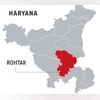Honouring 149 men who served under the British army during World War I, a humble plaque on an unassuming white wall in Jhajjar’s Gochhi village stands as a testament to its deep-rooted military heritage.
Jai Prakash, a retired soldier from the Grenadiers regiment, proudly showcases a cherished photograph of his late grandfather, Charan Singh, a former British Army serviceman. “I show this picture to my grandchildren so they always remember him,” he shares, a sense of pride resonating in his voice.
In this village of 5,000, military service is more than a career – it’s a family tradition. However, over the past two years, Gochhi has seen a diminishing enthusiasm towards joining the armed forces. Rajveer Singh, a former Army wireless operator, reflects on this shift: “I served in the Army for 15 years, but neither of my two sons wanted to join the forces.”
The Agnipath scheme, a recruitment policy announced by the Union government in June 2022, has stirred mixed feelings among the villagers. The policy, which reduces enlistment from 17 years to a mere four, has left many questioning its implications for the recruits, or the Agniveers. “There is a sense of uncertainty regarding job opportunities for our children after they serve for just four years under the Agnipath scheme,” laments Bijendra Singh, a local farmer.
Upon completion of their service, three-fourths of the Agniveers will be discharged with a “seva nidhi”, or severance package, instead of pension or gratuity. They will neither retain the “ex-serviceman” status nor will they be eligible for any benefits that come with the recognition of being one.
Yet for some, like 20-year-old Abimanyu from Bishan, the village of former Chief of the Army Staff General Dalbir Singh Suhag, the dream of serving in the Army remains undeterred. “I had almost given up after two attempts. But I have submitted the form again this year. There are some financial needs at home,” he confesses.
More From This Section
The Central government and some state governments have announced reservation in government jobs for the Agniveers. The Agnipath scheme, despite its contentious nature, has found its way into the political arena, featuring prominently in party manifestos in the ongoing Lok Sabha elections.
The ripple effects of the Agnipath scheme are felt beyond the villages. Coaching academies, once bustling with students preparing for the armed forces, are now grappling with dwindling enrolments. Dinesh Sangwan, director of Sangwan Defence Academy in Rohtak, notes, “We used to have 800-1,000 students. I just have about 100-150 students now.”
Sangwan says he has gradually changed the “business model” of his institute to keep it afloat. “Instead of only catering to defence exams, we have started coaching for other government exams, as well,” he says, claiming at least 20 such coaching institutes have shut down in Rohtak in the past two years amid dwindling enrolments.
The Army has recently announced an internal survey to assess the impact of the Agnipath scheme and recommend necessary modifications. Col (retd) Divakaran Padma Kumar Pillay, research fellow at the Manohar Parikkar Institute for Defence Studies and Analyses, suggests that a “policy evolution” is quite possible based on the feedback and evaluation of the scheme. “The review of the first batch which is being trained will come up only in 2026-2027, and that is when one can evaluate the actual performance. The training given was of a very high standard to ensure that those selected would deliver,” he said.
According to reports, while two batches of Agniveers in the Army are already serving, the third batch started training in November last year. Moreover, three batches in the Navy have completed training and one in the Air Force. Additionally, the Army has planned 96 recruitment rallies across the country this year, 11 of them especially for women.
“Soldiers typically hang up their boots after seven years. The idea of colour service was introduced in the 1970s. In fact, all the wars won were predominantly by soldiers who had served for seven years,” articulates Pillay. Colour service was a minimum 17-year tenure that a recruit would complete to be eligible for a pension.
Proponents of the Agnipath scheme argue that it could rejuvenate the military by lowering its average age, which, by some estimates, is higher than that of other countries. They also believe it could help curtail pension expenditure.
A study titled The Case for Agnipath -- written by Laxman Kumar Behera and Vinay Kaushal, and published by the Observer Research Foundation (ORF) -- projects savings of approximately Rs 15,400 crore on defence salaries by 2044, versus Rs 1,054 crore in 2022. “On pensions, however, there will be no savings in the near-to-medium term. The number of pensioners will keep increasing till all the current ORs (other ranks) retire by the year 2044…. It is, however, important to underscore that in the absence of Agnipath, the number of pensioners would have continued to swell without any break,” the study says.
Critics of the scheme, however, argue that it has not only demoralised future aspirants but also compromised national security. Manoj Joshi, a distinguished fellow at ORF and former member of the National Security Council’s Advisory Board, concurs: “If you have half-trained personnel manning the services, it affects national security.”
Joshi further elaborates that one needs to assess the benefits of the scheme for both soldiers and the nation. "On both counts, there is an issue. Four years of service may just about meet the Army's needs, but there is a question mark against the needs of technically oriented forces like the IAF and the Navy because they need more time to train their personnel for their jobs,” he says.
The country’s principal Opposition party, the Congress, has vowed to scrap the scheme on coming to power. But Joshi believes: “They (the Congress) will have to figure out how to deal with the issue of pensions in the armed forces because that is the issue that led to the scheme.”
)